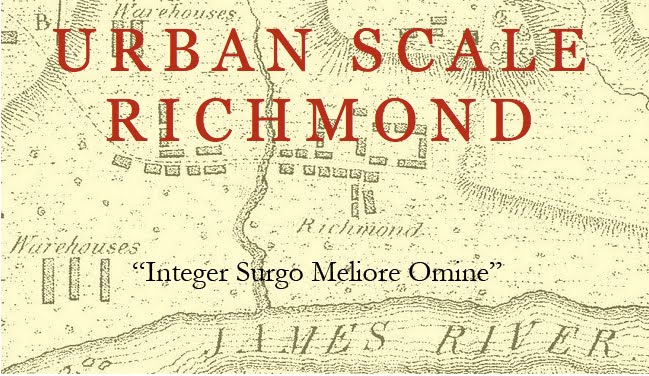 |
Tyler, left, exploring East Main Street for a blog entry in Spring of 2010 |
Here it is time that we should inscribe a terse memorial of our dear friend Tyler Potterfield.
It has been barely long enough since Tyler's death in late April to realize that is no longer with us. It's not just that he won't be biking over to sit at our table on an odd Wednesday evening, although that is very important. Here at Urbanismo, we also prized him as a keen critic and sympathetic observer. Tyler accompanied us on most of the tours posted on the blog. He understood what a city could be and where it missed the mark. It is very important to us to remember him in full, as a friend, an urbanist, a husband, and a historian of his adopted city of Richmond.
Tyler's presentation could be a little off-putting to those who didn't know him: the ghost of a downturned lip might have been mistaken for a kind of disdain. Nothing could have been less true of him-- although, if he could have been a snob, it would have been in the cause of good sense, accomplished woodcraft, and well composed surroundings. He preserved a laconic style even when delivering a pungent comment about poor design or mistaken planning decisions; his compliments were always meaningful. It is a little known fact in Tyler's history that he once aspired to be a minister in the Lutheran Church. He very much enjoyed singing in church choirs.
As a connoisseur of urbanity, Tyler was always pleased to explore great cities and great museums. He also understood the margins of the wilderness: Tyler especially prized his time hiking and fishing from "Windy Inn," the almost plumbing-free lodge founded by his grandparents on a Pennsylvania trout stream. We got to visit more than once and relished the trails and the quiet porch hammock.
In the field, Tyler was a Boy Scout. When on an expedition, he displayed what his necessarily tolerant wife, Maura, once called his "Moonrise Kingdom mode." He was invariably outfitted with selected bits of the traditional kit that went along with living outdoors: shorts, nice hiking boots, elegant envelopes for fishing lures, perhaps a belt for secateurs and small hand-axes that could be useful for clearing trails, a thorn-proof vest, and a cap redolent of the Scottish highlands, ornamented with a clan badge improvised from a sprig of oak. In recent years, his walks regularly led along the bank of a trout stream.
And then there were the undertakings: restoring bridges, fostering the building crafts, marriage, learning to fish, protecting canals, cemeteries, neighborhoods, and making a Corinthian library according to the order of the "Tower of the Winds." Most of these were very successful. Both of us at Urbanismo cut our professional teeth cataloging entire streetcar suburbs under Tyler's careful administration. In recent years, Tyler was increasingly recognized as an articulate defender of the city's urban landscape. He was able to transcend his official position as the city's senior preservation planner to become a personal advocate for key elements in the historic urban fabric that serve the public good.
We also watched when Tyler and Maura, after an eventful courtship, walked into St. Andrews Church and came out in a new combination, making a particular life together in their lovingly tended Oregon Hill row house. Their companionship glowed under the stress of their frequent hospitality: Maura's elegant meals, Tyler's various aperitif combinations, dinner in the kitchen or garden, quoits in the back alley.
His most charming gift was for the creation of what Edmund Burke called the "little platoons," those small societies which make the city stronger and more humane. When he wasn't hoeing or pruning or riding his bicycle, he was continually launching serial organizations, professional circles, student clubs, and quoits teams, all of a duration short enough to prevent them from becoming automatic and, therefore, boring. Short, almost illegible notes were succeeded in recent years by email invitations. Most recently, he organized monthly conversations among the city's upcoming cadre of urban planners.
And, as his most accessible accomplishment, Tyler brought his walker's eye to scholarship. Nonesuch Place, his memorable history of the Richmond landscape, cuts across the grain of traditional civic history. It reminds us of Walter Muir Whitehill's elegantly crafted Topographical History of Boston, gifting the city with a new and exciting way of understanding itself.
Among all of these projects, Tyler was his own best effort. He was loyal, brave, very true, and most of those other things as well, even thrifty. Who knows what his next project might have become or might be? What is needed just now is a topographical history of Tyler Potterfield. We won't forget him anytime soon.
